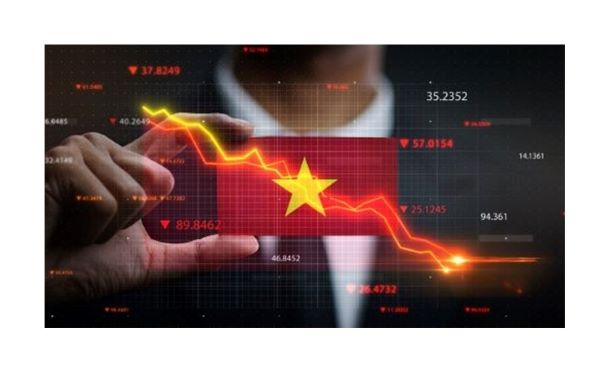The four main risks that Vietnam’s economy will face in 2023 include: Impact from the economic downturn of major markets, Zero COVID-19 policy from China, Exchange rate and Inflation.
According to the Macro Update report released by VNDirect Securities Joint Stock Company, Vietnam’s growth momentum may slow down in the fourth quarter of 2022 and 2023 due to growing concerns about a global recession.
VNDirect is concerned that high inflation pressures, tightening global financial conditions and supply chain disruptions may weaken the growth prospects of the global economy.
The stagnation of global economic growth was reflected in the data of the world’s largest economy when the US GDP fell by 0.9% in the second quarter of 2022. The reason comes from the housing market struggling due to rising interest rates and high inflation, causing business investment and consumer spending to shrink.
As a result, the US Federal Reserve (Fed) has lowered its forecast for US economic growth to 1.2% in 2023, from the previous forecast at 1.7%. Vietnam’s other major trading partners such as Europe and China also face dismal economic growth forecasts for the period 2022-2023.
The IMF warned in its latest report that global growth may continue to decelerate in 2023, with some countries accounting for about a third of the global economy possibly facing a recession in 2022 or 2023.
VNDirect maintains that Vietnam’s GDP growth peaked in the third quarter of 2022 and will slow down in the fourth quarter of 2022 due to weak external demand.
The reason is that Vietnam’s major trading partners such as the US and the EU have experienced slow economic growth, which may reduce the export prospects of Vietnam. At the same time, rising inflation could affect the recovery of domestic consumption. Rising interest rates increase costs and affect business expansion plans, which is also a negative factor to Vietnam’s economy.
However, there are still supporting factors for Vietnam’s growth in 2023 such as abundant public investment capital and a strong recovery in international tourist arrivals. Overall, Vietnam will still be one of the fastest growing countries in the Asia-Pacific region in the period 2022-2023.
Four main risks to Vietnam’s economy
A report from VNDirect indicates that there are several risks to the Vietnamese economy in the coming months.
Firstly, the Fed and the European Central Bank continue to maintain tight monetary policy to control inflation.
This will make interest rates increase in the future, dragging down consumer demand. Lower consumer demand in the US and Europe will negatively affect Vietnam’s exports to these two markets (accounting for nearly half of Vietnam’s total export value in 2021) in the coming quarters.
Second is the Zero COVID-19 policy and the increasing uncertainties of the Chinese economy. Record high temperatures and severe drought in southwestern China have crippled hydroelectricity production and forced many plants in that region to close. It is the latest blow to the Chinese economy, which has seen slow growth in consumer spending and a struggling property market. China’s economic slowdown will affect Vietnam’s exports to this market.
The closure of factories in China due to the Zero COVID-19 policy or power cuts may negatively impact Vietnam’s manufacturing sector as Vietnam is highly dependent on input materials such as textile, metallurgy, chemical, electronics from China.
Third, in terms of exchange rate, the strong increase of the value of the USD puts great pressure on the exchange rate of Vietnam. In order to stabilize the exchange rate, the State Bank of Vietnam (SBV) had to intervene in the market and sell off a large amount of foreign exchange reserves. However, if the USD continues to strengthen, the SBV will have less resources to intervene because foreign exchange reserves are thinner than before. In a worse case, the SBV may have to consider an increase in operating interest rates, thereby increasing business costs and negatively affecting the economic recovery.
Finally, inflation risks still exist because the Russia-Ukraine conflict has been prolonged, which caused disruptions to global supply chains. Higher-than-expected inflation could hamper economic growth and lead to tighter monetary policy. The SBV has less room to maintain loose monetary policy to support the economy.
 Henry Tran – VietnamCredit
Henry Tran – VietnamCredit


























